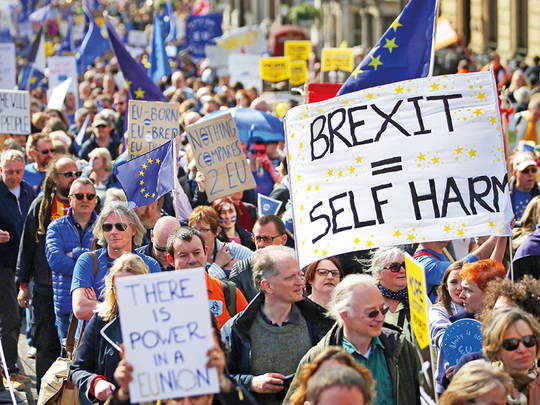
Dublin: The nine-month Brexit “phoney war” is set to come to an end next week when British Prime Minister Theresa May notifies the European Union of Britain’s intention to leave, starting two years of unprecedented negotiations.
May will send a letter to European Council President Donald Tusk on Wednesday to trigger Article 50 of the Lisbon Treaty.
Tusk will then send draft negotiating guidelines to the 27 other member states within 48 hours.
That means it will finally be down to business after an at times painstakingly slow drawing of battle lines.
May has revealed little of her strategy to secure what she calls “the best possible deal” for the world’s fifth-largest economy. Her letter next week and Tusk’s reply may offer markets keen for details some hints at how rocky the path ahead may be.
“The tone of this process might have implications for sterling markets,” said Investec economist Chris Hare.
On Friday, revised fourth-quarter GDP (gross domestic product) data will outline how Britain will come to the Brexit negotiating table with a far healthier economy than most predicted last June.
After retail sales suffered their biggest squeeze in nearly seven years on Thursday as higher inflation begins to bite, timelier indicators next week including mortgage approvals, house prices and consumer confidence may be worth watching more closely.
Trump’s test
The potential economic implications of 2016’s other major earthquake at the ballot box — the election of US President Donald Trump — could play out at a much faster pace with Friday’s do-or-die rescheduled vote on a new health care bill.
The vote has been billed by financial markets as a crucial test of Trump’s ability to work with Congress to deliver on pro-growth policies like tax cuts and infrastructure spending.
Leaders from Trump’s Republican party postponed what was supposed to have been his first legislative victory because of opposition from two flanks in the party on Thursday. Even if it gets approval from the House, the legislation could face an even tougher fight in the Senate, the other chamber of Congress.
A raft of speeches from top Federal Reserve officials — 10 days after the bank raised interest rates for the second time in three months — may pale in comparison to the political drama, as could GDP revisions and key manufacturing surveys.
Rising inflation
In a date-heavy week around the world, Eurozone flash inflation readings for March stand out after annual price rises surged to a four-year high of 2.0 per cent in February, zooming up to the European Central Bank’s target of “below but close to 2 per cent”.
Rising inflation across the 19-country bloc has put pressure on rate setters to say when and how extraordinary stimulus measures could be scaled back, although still weak underlying figures have limited discussions so far.
“We expect that run to have come to an end this month,” wrote economists at RBC Capital Markets, referring to the six consecutive months of year-on-year headline inflation rate rises.












